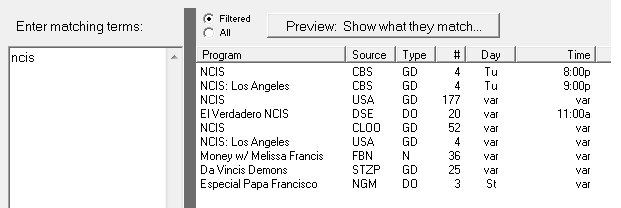Match Programs by Name
This qualifier lets you define a daypart so that it includes only those programs whose names "match" the keywords you specify.
Matching by names is simple, and it has the advantage that you do not need to depend on how the data supplier (such as Nielsen) codes the program in the future. Also, in some cases (e.g., "Who Wants To Be A Millionaire"), Nielsen attaches a separate coding number to each telecast, but matching by name makes selection easy.
Enter matching terms
You enter your keyword or keywords in the panel on the left side. You can preview what programs these keywords match by clicking on the "Preview" button. There is a "splitter" between these two sides which you can drag to rearrange the space.
Note the subtlety here: the definition you are giving is the set of keywords.
The list of programs on the right is what that definition will select for the current range of dates. The distinction is important if you plan to use this script again to create another database with a different range of dates.
Match rules
The "match" process follows a few simple rules:
1. Case ("A" versus "a") is ignored: "news", "News" and "NeWs" are all the same
2. TView looks for names that contain the keyword entered. For example, if you enter "news", this will match programs that have those four letters anywhere in their name:

3. You can use either "+" or "&" to note that a program must contain both of two keywords. Both keywords must be present in the same of the program, though they can be in either order:

4. Enter keywords on separate lines to say that a program can match any of these to qualify:

Filtered or All
Next to the "Preview" button is a choice between "Filtered" or "All". This lets you decide which programs to list: 1) only those programs that match both the match terms and all requirements of the preceding tabs, or 2) all programs that match the terms, regardless of settings on previous tabs.
Preview the Match
Click the "Preview: Show what they match" button to see the effect of your match entries.
Beware of Abbreviated and Duplicated Names
The program names shown by TView come directly from the data supplier (e.g., Nielsen), and sometimes the names shown are shortened or abbreviated or cryptic. Some examples (with the actual names shown by U.S. Nielsen):
If You Request... |
And Data Supplier Carries It As... |
Will Names Match? |
World News Tonight |
Wrld News Tonight |
No |
Olympics Opening Ceremony |
Sum Olym Open Cerem |
No |
Law & Order |
Law and Order |
No |
Law+Order |
Law and Order |
Yes |
Mike and Molly |
Mike & Molly |
No |
Mike+Molly |
Mike & Molly |
Yes |
Swimming National Championship |
Swimming Nat'l Champ |
No |
Swim+Nat+Champ |
Swimming Nat'l Champ |
Yes |
Jimmy Kimmel |
J. Kimmel |
No |
Kimmel |
J. Kimmel |
Yes |
Beware of Unintended Matches
Choose terms to be matched carefully. A problem with matching by name is that some terms will match programs unrelated to what you are actually looking for! For example, "NCIS" matches both the original NCIS and its spinoff NCIS: Los Angeles, but it also matches "Melissa Francis", "Papa Francisco", and even "Da Vincis Demons" (which Nielsen spells without its apostrophe).

Which Did You Want? |
|
Don FraNCISco |
NCIS |
What To Do If Matching Wouldn't Work
In such cases, you will need to use the "Programs" defining tab.


